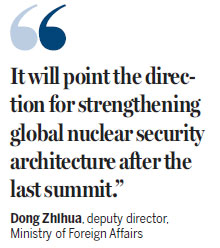Xi's summit trip seen as success in diplomacy
President Xi Jinping's participation in the fourth Nuclear Security Summit in Washington has won positive reviews.
Dong Zhihua, deputy director of the arms control and disarmament department of the Ministry of Foreign Affairs, said top Chinese leaders have paid great attention to nuclear security and demonstrated their firm support for the global fight against nuclear terrorism.
Chinese presidents have attended all four summits, including two recent ones by Xi, who attended all the formal agenda sessions of the March 31-April 1 summit.
Dong applauded China's proposals made by Xi at the summit, which she said "led the discussion to a positive outcome".
The summit, which was attended by leaders from more than 50 countries, issued a communique on April 1 pledging continued commitment to nuclear security as an enduring priority.
It also announced action plans to support a list of international organizations such as the United Nations and International Atomic Energy Agency (IAEA).
Xi delivered speeches at several events, such as the welcome dinner on March 31, the plenary session and the scenario-based discussions on April 1.

In a briefing after the summit, Dong characterized the four proposals by Xi as strengthening political input, national responsibility, international cooperation and nuclear security culture.
She said Xi's remarks have drawn a positive response from other leaders and also are reflected in the outcome documents of the summit.
"The proposals are a major contribution China has made to the summit. It will point the direction for strengthening global nuclear security architecture after the last summit," she said.
Xi also put forward five initiatives in his speech. They include conducting training and technical exchange at the newly inaugurated Nuclear Security Center of Excellence (COE) in Beijing and at the China Customs Radiation Detection Training Center in Qinhuangdao, Hebei province. Both are joint programs between China and the US.
US President Barack Obama, Secretary of State John Kerry and Secretary of Energy Ernest Moniz all mentioned the new state-of-the-art COE in China in their speeches during the summit as a demonstration of China-US cooperation.
Meanwhile, China is also helping Ghana to convert a highly enriched uranium (HEU)-fueled research reactor to using low enriched uranium (LEU) within the framework of the IAEA.
China pledged at the summit to strengthen the monitoring of radioactive sources in China, cooperate with other nations and organizations in civil-use nuclear material research, and help other nations elevate their management.
Dong believes the Chinese initiatives will provide public good in nuclear security to the Asia-Pacific region and the international community. China has an ambitious plan for developing renewable energy, including nuclear energy. It also has been exporting nuclear reactors to other nations.
The initiative is also expected to help the destination nations of China's nuclear energy export, countries along the One Belt and One Road project and many developing nations. The One Belt and One Road is a Chinese initiative that focuses on the connectivity and cooperation among nations, mostly in Eurasia.
Dong said China has kept its commitments made during previous summits, adding that it "demonstrates the sense of responsibility of China as a major country".
chenweihua@chinadailyusa.com
(China Daily USA 04/04/2016 page2)


















